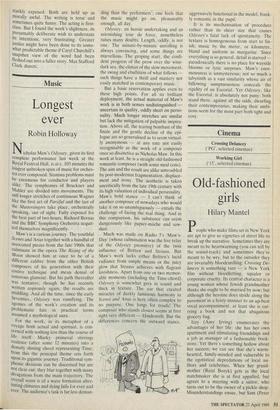Music
Longest ever
Robin Holloway
, icholas Maw's Odyssey, given its first complete performance last week at the Royal Festival Hall, is at c. 103 minutes the longest unbrOken span of music for orches- tra ever composed. Stamina problems must be enormous for conductor and players alike; The symphonies Of Bruckner and Mahler are divided into. movements. The Still longer stretches of continuous Wagner like the first act of Parsifal and the last of the Mastersingers take place, orchestrally Speaking, 'out of sight. Fully exposed for the best part Of two hours, Richard Bernas and the BBC Symphony Orchestra acquit- ted themselves magnificently.
Maw's is a curious journey. The youthful Scenes and Arias together with a handful of associated pieces from the late 1960s that culminate in the opera The Rising of the Moon showed him at onee to be of a different calibre' from the other British composers of his generation with their costive technique and mean denial of sonorous glamour. But his path thereafter was tentative; though he has recently written copiously again, the results are middling. And all the time, since the early Seventies. Odyssey was ramifying. The agonies of the work's creation and its Problematic fate in practical terms assumed a mythological aura.
For the work, in its metaphor of a voyage both actual and spiritual, is con- cerned with nothing less than the course of life itself. Murky primeval stirrings coalesce (after some 12 minutes) into a densely shining chord representing Time; from this the principal theme sets forth upon its gigantic journey. Traditional sym- phonic divisions can be discerned but are not clear-cut; they blur together with many divagations from the main trajectory. The overail sense is of a wave formation alter- nating cliinaxes and dying falls for ever and ever. The audience's task is far less deman-
ding than the performers'; one feels that the music might go on, pleasurably enough, all day.
Odyssey, an heroic undertaking and an astonishing tour de force, nonetheless raises many doubts. Length, oddly, is not one. The minute-by-minute unrolling is always convincing, and some things are marvellous. The groping start, the confi- dent progress of the prow over the wine- dark sea, the climax of the slow movement, the swing and ebullition Of what follows — such things have a thrill and mastery not easily matched in contemporary music.
But a basic reservatiOn applies even to these high points. For all its brilliant deployment, the actual material of Maw's work is in both senses undistinguished — uncertain in quality, oddly short on perso- nality. Much longer stretches are similar but lack the mitigation of palpable inspira- tion. Above all, the tearing bombast of the finale and the gentle decline of the epi- logue are so generalised as to seem virtual- ly anonymous — at any rate not easily recognisable as the work of a composer once so disiinctive as Nicholas Maw. In this work at least, he is a straight old-fashioned romantic composer (with Some mod cons). The aim and the result are alike untroubled by post-modernist fragmentation, displace- ment and irony. The aesthetic is taken uncritically from the late 19th century with its high valuation of individual personality. Maw's bold stance — I can't think of another composer of nowadays who would take it on so unambiguously — entails the challenge of facing the real thing. And in this comparison, his substance can seem dangerously like papier-mache and saw- dust.
Much was made on Radio 3's 'Maw's- Day' (whose culmination was the live relay of the Odyssey premiere) of the twin influence of Britten and Strauss. But Maw's work lacks either Britten's lucid radiance from simple means or the juicy glow that Strauss achieves with flagrant lavishness. Apart from one or two memor- able moments (including the Time-chord) Odyssey is somewhat grey in sound and thick in texture. The ear that created miracles of darkly luminous harmony in Scenes and Arias is here often complex to no purpose. One longs for triads! The composer who stands closest seems at first sight very different — Hindemith. But the differences concern the outward stance,
aggressively functional in the model, frank- ly romantic in the pupil.
It is its mechanisation of procedure rather than its sheer size that causes Odyssey's fatal lack of spontaneity. The texture is homogeneous from start to fin- ish; music by the metre, or kilometre, bland and uniform as margarine. Since everything is so general, detail is starved — paradoxically there is no place for wayside blooms or lyric surprises. Maw's enor- mousness is unmysterious; not so much a labyrinth as a vast similarity whose air of billowing sumptuousness conceals the rigidity of an Escorial. Yet Odyssey, like the Escorial, is absolutely not puny: both stand there, against all the odds, dwarfing their contemporaries, making their ambi- tions seem for the most part both tight and cosy.


































































 Previous page
Previous page